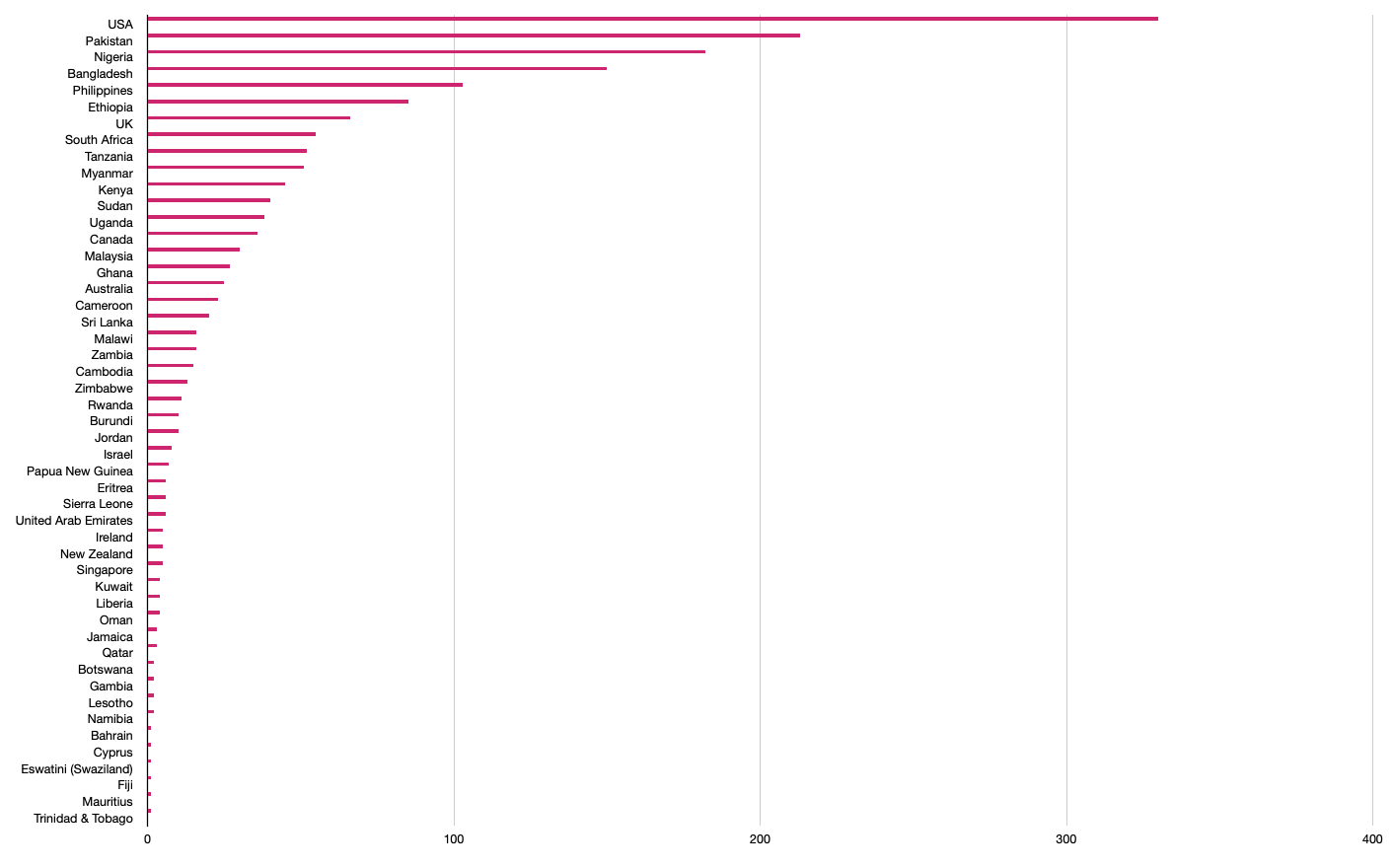English in the World
Where is English spoken?
Short answer: all around the world.
While Mandarin has more than twice as many native speakers (over a billion) as English, and Spanish has about ten per cent more, it is English which has the greatest number of people who can use it to communicate.
Where is English spoken as an official language or a de facto official language?
Let’s start with USA, UK, Canada, Australia, New Zealand, Ireland – listed in terms of millions of speakers.

Then there are the former British colonies where English is spoken alongside local languages and where it is often used – for convenience and efficiency – as the means of administration and communication, often because there are so many local languages. India is an example.
India has more English speakers than has England.
As a former British colony, India has maintained its linguistic links to Britain for practical reasons: since there are some eight hundred different languages spoken in India, giving official status to all of them according to their regions would prove a bureaucratic nightmare. There is no official language in India but Hindi and English are both used in government.
Countries where English is a de facto, de jure or official language
(>1 million population)
India (1,200 million people) tops the chart.
If we could fit the line for India on this webpage, it would stretch more than 3.5 times the length of the line for the USA!
Country

Population in millions
English is widely spoken throughout Asia and Africa.
In Singapore, all signs are in English and I have yet to meet a Singaporean who can’t speak English. Indeed, English is widely used in many parts of Asia and Africa and is the language which most students aspire to learn.
How extensively is English used in Europe?
Having lived in various European countries, I can testify to the fact that English is very widely spoken. Most children are required to learn English at school and the standard of instruction is usually high. In Scandinavia, for instance, everyone seems to speak excellent English. Not all countries achieve this standard, but English is considered important everywhere.
Indeed, employment in the professions in most European countries requires at least a working knowledge of English. Monolingual anglophone friends of mine have visited doctors, dentists, solicitors and the like without having a word of the local language – but they have been admirably assisted by anglophone professionals.
In Europe many universities teach courses in English: for instance, the Jagiellonian University in Krakow, one of Europe’s oldest and most prestigious universities, began teaching Medicine in English in 1994. Since then, numerous universities, especially in eastern Europe, have introduced many courses in which English is the language of tuition.
What about the role of English in academia generally?
English is the language of international academic prestige and major anglophone universities have established campuses in numerous countries.
Parents in Asian countries, in particular, are also keen to provide their children with the opportunity to study in an anglophone country. The international education sector is enormous, with universities in anglophone countries deriving much of their income from the fees of international students who seek the many advantages offered by anglophone education, qualifications and experience.
Indeed, throughout academia, it is English which is regarded as the first language for research. I have colleagues at several European universities, for instance, who publish primarily in English, largely so their work can be more extensively reviewed than it would be if it were published in a less widely understood language.
How extensively is English used in business?
Ever more widely is the short answer!
All over the world there are more and more companies in which the working environment is entirely English. Think Rakuten and Nissan (Japan), Raiffeisen Bank (Austria), Sodexo (France) to begin with – and that’s before we consider the numerous technology companies who recruit anglophone staff from all over the world.
And so on – English in other environments
English is also an official language of the United Nations, the Olympic Games, the European Union – and the language of aviation. As one who travels regularly on airlines from Europe, Asia and the Middle East, I can assure you that, in addition to the language of their home country, the language they all offer is English. Ticketing, boarding passes, in-flight entertainment and menus are always offered in English. I have always found it weird that, once I board an aircraft in any non-anglophone country, it is expected that English will be the language of communication. Fortunately I can oblige!
I live in continental Europe where, even if I couldn’t speak the local language, I would be able to go about my daily business – in English – without much difficulty. So many websites offer an English shopping option; mobile phone companies offer English support; my solicitor speaks excellent English and my dentist studied in Canada. It’s all so very easy for an anglophone!
While such a level of customer service is wonderful, I must confess that, if I were a local, I’d be annoyed by the ubiquitous advertisements for ‘factory outlets’ and the like since each language has its own perfectly adequate vocabulary to describe such phenomena. English, however, still seems to have aspirational connotations…
And so it is that English is used almost everywhere and there is little doubt that it is the language used to facilitate communication in most spheres of endeavour. It could be argued that English has supplanted French, the original lingua franca, as the most important language in the world.


